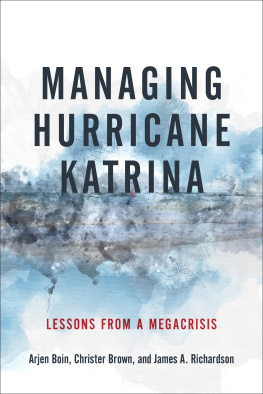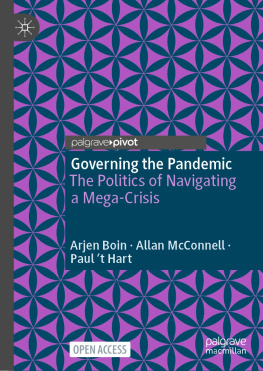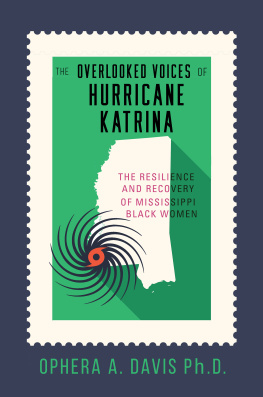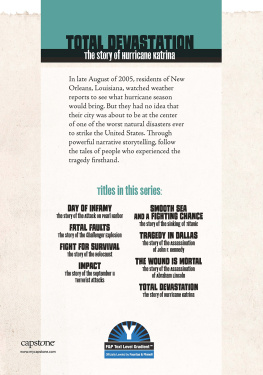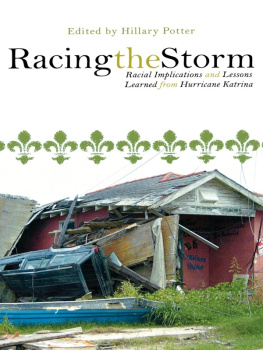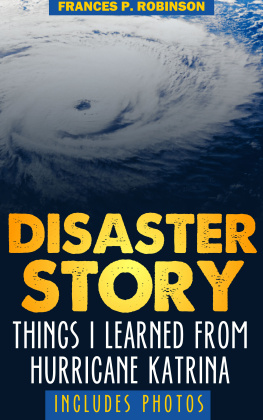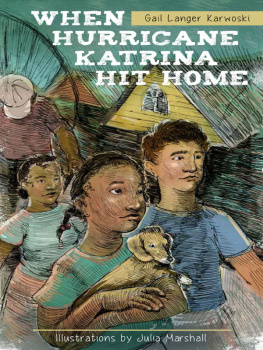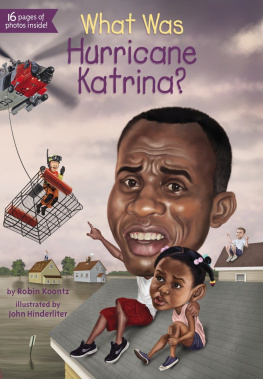Published by Louisiana State University Press
Copyright 2019 by Louisiana State University Press
All rights reserved
Manufactured in the United States of America
First printing
Designer: Barbara Neely Bourgoyne
Typeface: Whitman
Printer and binder: Sheridan Books
Library of Congress Cataloging-in-Publication Data
Names: Boin, Arjen, author. | Brown, Christer, 1980 author. | Richardson, James A., author.
Title: Managing Hurricane Katrina : lessons from a megacrisis / Arjen Boin, Christer Brown, and James A. Richardson.
Description: Baton Rouge : Louisiana State University Press, [2019] | Includes bibliographical
references and index.
Identifiers: LCCN 2018036777 | ISBN 978-0-8071-7044-1 (cloth : alk. paper) | ISBN 978-0-8071-7092-2 (epub) | ISBN 978-0-8071-7091-5 (pdf)
Subjects: LCSH: Hurricane Katrina, 2005. | Emergency managementGulf Coast (U.S.) |
Disaster reliefGovernment policyGulf Coast (U.S.) | Crisis management in governmentUnited States.
Classification: LCC HV551.4.G85 B65 2019 | DDC 976/.044dc23
LC record available at https://lccn.loc.gov/2018036777
The paper in this book meets the guidelines for permanence and durability of the Committee on Production Guidelines for Book Longevity of the Council on Library Resources.

CONTENTS
PREFACE | ABBREVIATIONS
HURRICANE KATRINA: A Quick Timeline
Hurricane Katrina Revisited: Reflecting on Success and Failure
Why Didnt They See It Coming? The Challenges of
Timely Crisis Recognition
Understanding the Unimaginable: Why Collective Sense
Making Failed
Whos in Charge Here? Coordinating a Multilevel Response
Meaning Making in Crisis: The Detrimental Effects of Missing
Narratives and Escalating Blame Games
Conclusion: Lessons of a Mega-disaster
APPENDIX I: Timeline on Levee Breaches
APPENDIX II: Emergency Management in the American Federal System
NOTES | BIBLIOGRAPHY | INDEX
PREFACE
So why another book about Hurricane Katrina?
Much has been written on Katrina. In the summer of 2015, a decade after the storm, the bookshop at the Louisiana State University campus featured a long, overloaded table on this mega-disaster. Apart from the congressional reports and many other official documents, the years after Katrina have seen a wave of memoirs, journalistic accounts, documentaries, and academic analyses.
We had originally planned this book to be in bookstores around that time. But it has taken us much longer to complete our research than we anticipated. The fact that so much happened in that first week of the disaster alone meant that we spent many months just fact-checking what we and others had written.
We pressed on because we believe there are still lessons to be learned from this disaster, especially for practitioners operating at the strategic level of crisis management systems. Our envisioned contribution is twofold.
First, we offer a clear and theory-based evaluative framework that allows for a fair assessment of crisis management performance. In the months and years after Katrina, the performance of strategic actors (the mayor of New Orleans, the governor of Louisiana, the Federal Emergency Management Agency director, the president of the United States) has been panned. If all the books and reports out there are to be believed, these authority figures acted sloppily, sluggishly, and with a disregard for their responsibilities. Our framework moves the analytical focus from these individual leaders to the system that was designed to produce an effective and legitimate response. Our analysis is more fine grained and subtle than the political reports and emotional memoirs.
Second, we study the response to this disaster with an eye on improving the response to future mega-disasters no matter where they might strike. We are facing new threats, ranging from climate change to cyberattacks. We have no doubt that new threats will at some point produce new types of rude surprises (a phrase coined by the brilliant Todd LaPorte). Hurricane Katrina, like the 9/11
attacks, can be viewed as a mega-disaster laboratory. What went wrong in 2005 may well go wrong in the near future. For this reason alone, learning from Katrina
is a critical task for public administration and crisis scholars alike.
Our team packs expertise on exactly these two areas. Arjen Boin is a crisis scholar with a public administration background. Christer Brown combines scholarly crisis expertise with the experience of a crisis management practitioner. Jim Richardson is a public administration scholar who knows Louisiana government and politics like few others.
We experienced Katrina from very different vantage points. Arjen had just arrived in Chapel Hill for a sabbatical at the University of North Carolina. Coming from the Netherlands, he closely followed the unfolding disaster like most Americans did (through radio, television, and newspapers). It was only much later, after he had moved to Baton Rouge to take a job at Louisiana State University, that he learned about the complexities of the disaster. Talking to many people who had suffered through Katrina, professionally or personally (often both), he slowly began to understand that the received wisdom on the response was uninformed, incomplete, and shallow.
Christer happened to experience Katrina during a visit to his hometown, Houston, which received tens of thousands of New Orleanians after Katrina and then was partially evacuated ahead of Hurricane Rita less than a month later (as we write these words, a massive flood produced by Hurricane Harvey is bringing Houston to its knees). Dozens, many elderly, would die in the evacuation ahead of Rita. Upon returning to Sweden and completing his studies, Christer joined the National Center for Crisis Management Research and Training at the Swedish Defence University, where his first assignment was to dissect the crisis decision-making that occurred during Katrina. This and other hurricane-related projects formed the foundations for his doctoral work at Radboud University Nijmegen in the Netherlands. In his thesis, Christer studied why organizations sometimes struggle to respond to foreseeable complex threats, focusing on FEMA and Katrina.
Jim Richardson was in Louisiana when it all happened. Just before Katrina, Jim and his wife had moved into the Lod Cook Hotel on the LSU campus while his house was being renovated. His daughter was working for Senator Mary Landrieu and happened to spend the week with her parents.
Then Lod Cook became a place for families fleeing New Orleans, Jefferson Parish, and St. Tammany Parish. There was much fear and deep uncertainty about their homes, schools, businesses, and so on. Soon families began to look for schools and housing in the Baton Rouge area. Driving around the city, Jim saw families standing in line at Walmart and Target, buying new clothing for their childrenfrom underclothes to socks to shirts and pants. These families had lost everything. People were scared and absolutely unsure of what might happen to them next.
Katrina affected the rich and the poor, but the ability to cope with the storm favored the rich. The people at Lod Cook were for the most part affluent. They had the financial ability to take care of themselves for the next three to six months,



